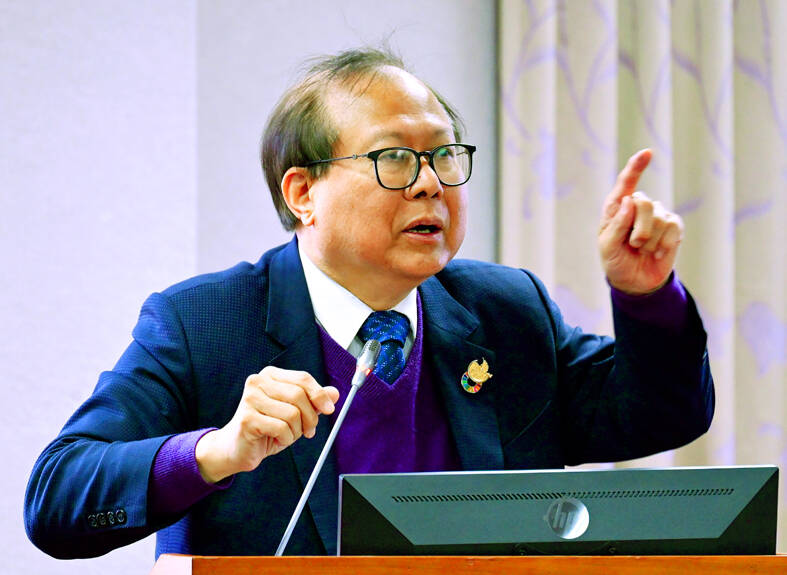The government is considering allowing public servants three days per year of paid mental health leave, Directorate-General of Personnel Administration Director-General Su Chun-jung (蘇俊榮) said yesterday.
The agency on Monday forwarded the proposal to the Examination Yuan, which is to review it jointly with the Executive Yuan.
The measure is designed to improve the mental fortitude of public-sector workers, with mental health the focus of the Presidential Office’s Healthy Taiwan Promotion Committee, Su told a meeting of the Judiciary and Organic Laws and Statues Committee at the legislature in Taipei yesterday.

Photo: Liu Hsin-de, Taipei Times
The three days would be part of the seven days of guaranteed personal leave, he said.
It would be paid leave, would not affect performance evaluations and would not require proof, Su said, adding that work units could not refuse requests for mental health leave, nor issue punitive measures of any sort over them.
Regarding holidays, Su said that he was not opposed to the issue of making Labor Day a national holiday, adding that his agency would comply with the Ministry of the Interior’s decision pending its review of May 1 becoming a state holiday.
Su said he had reservations over a proposal to reinstate seven national holidays removed by the government in 2016, as the move would affect the education of children in rural areas.
Separately, the Examination Yuan said that while wage hikes would mean that college graduates would start at NT$55,000 per month in public-sector jobs if they pass the civil service exams, the number of people sitting the exams had dropped to 4,994 in 2023 from 34,000 in 2012, an 86 percent decline.
The branch would initiate a four-year plan to attract talent to work for the government, Examination Yuan Secretary-General Jason Liu (劉建忻) said.
Measures include fostering interbranch collaboration, ameliorating regulations for national exams and personnel management, moving to a digital-based system, improving administrative staff training for better performance at the local and central government levels, and cultivating friendlier working environments, Liu said.
Minister of Examination Lio Mon-chi (劉孟奇) said that the ministry would amend regulations to create a more flexible exam system.
The government would update its archives of exam questions more frequently, propose strategies to attract more people to work in the public sector, and use artificial intelligence, big data and the cloud to create more innovative services, Lio said.
Additional reporting by CNA

Taiwan is projected to lose a working-age population of about 6.67 million people in two waves of retirement in the coming years, as the nation confronts accelerating demographic decline and a shortage of younger workers to take their place, the Ministry of the Interior said. Taiwan experienced its largest baby boom between 1958 and 1966, when the population grew by 3.78 million, followed by a second surge of 2.89 million between 1976 and 1982, ministry data showed. In 2023, the first of those baby boom generations — those born in the late 1950s and early 1960s — began to enter retirement, triggering

One of two tropical depressions that formed off Taiwan yesterday morning could turn into a moderate typhoon by the weekend, the Central Weather Administration (CWA) said yesterday. Tropical Depression No. 21 formed at 8am about 1,850km off the southeast coast, CWA forecaster Lee Meng-hsuan (李孟軒) said. The weather system is expected to move northwest as it builds momentum, possibly intensifying this weekend into a typhoon, which would be called Mitag, Lee said. The radius of the storm is expected to reach almost 200km, she said. It is forecast to approach the southeast of Taiwan on Monday next week and pass through the Bashi Channel

NO CHANGE: The TRA makes clear that the US does not consider the status of Taiwan to have been determined by WWII-era documents, a former AIT deputy director said The American Institute in Taiwan’s (AIT) comments that World War-II era documents do not determine Taiwan’s political status accurately conveyed the US’ stance, the US Department of State said. An AIT spokesperson on Saturday said that a Chinese official mischaracterized World War II-era documents as stating that Taiwan was ceded to the China. The remarks from the US’ de facto embassy in Taiwan drew criticism from the Ma Ying-jeou Foundation, whose director said the comments put Taiwan in danger. The Chinese-language United Daily News yesterday reported that a US State Department spokesperson confirmed the AIT’s position. They added that the US would continue to

The number of Chinese spouses applying for dependent residency as well as long-term residency in Taiwan has decreased, the Mainland Affairs Council said yesterday, adding that the reduction of Chinese spouses staying or living in Taiwan is only one facet reflecting the general decrease in the number of people willing to get married in Taiwan. The number of Chinese spouses applying for dependent residency last year was 7,123, down by 2,931, or 29.15 percent, from the previous year. The same census showed that the number of Chinese spouses applying for long-term residency and receiving approval last year stood at 2,973, down 1,520,